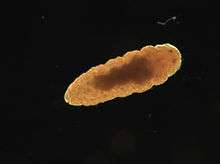Dinophalus taeniatus
| Dinophalus taeniatus | |
|---|---|
 | |
| Scientific classification | |
| Kingdom: | Animalia |
| Phylum: | Annelida |
| Class: | Polychaeta |
| Subclass: | incertae sedis |
| Family: | Dinophilidae |
| Genus: | Dinophilus |
| Species: | D. taenitus |
| Binomial name | |
| Dinophilus teanitus Harmer, 1889[1] | |
Dinophilus taenitus is 1.5 – 2.5 mm long and about 150 µm wide, and its colour is orange with two distinct black eyes on prostomium. Prostomium has two ciliary rings with a mid-dorsal interruption, and second ring being widest. Anterior part of prosomium has four large and many small bristeles and sensory cilia. The trunk consist of 11 rings where the first 9 rings are easily distinctly separable Ventral trunk densely covered with cilia.[2] [3]
Ecology
Free swimming “Dinophilus taenitus” are found October to June lives in tidal pools with the diatom “Enteromopha” spp. and “Ulva lactuca”. Numbers peak March to April and decline with rising temperature and lesser diatom abundances, the decline is due to death of reproducing adults and obligatory encystment of juveniles.[2][3]
Distribution
North Sea (Scottish and English east coast. Belgian coast Helgoland(?). English Channel (Plymouth, Roscoff). Irish Sea (North Wales, Isle of Man). Atlantic (Irish coasts, Faroe Islands). Spanish coast (Valencia) Baltic (Kiel Bay). Skagerrak (Swedish west coast). White sea. Barents Sea.[3]
Reproduction
Females produces a maximum of 4 cocoons with up to 16 eggs each in a sequence of 2–3 months.. Excysted worms mature, feed and reproduce sexually until may.[3]
References
- ↑ Harmer, Sidney F, Proceedings of the Cambridge Philosophical Society, 6(6):1, 1889
- 1 2 Jennings, Jb; Pj Donworth (December 1986). "Observations on the Life-Cycle and Nutrition of Dinophilus-Taeniatus Harmer 1889 (annelida, Polychaeta)". Ophelia. 25 (3): 119–137. doi:10.1080/00785326.1986.10429744. ISSN 0078-5326.
- 1 2 3 4 Westheide, W. Polychaetes: Interstitial Families. Synopsis of the British Fauna. 2008. Field Studies Council. Retrieved 2013-08-24.